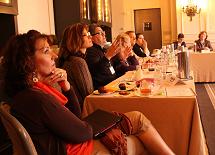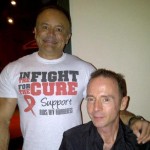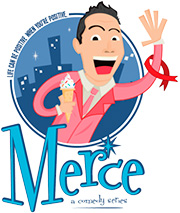You’re part of a healthcare revolution in cyberspace, my friends. It’s changing the way people find treatment information, relate to their doctor, and support one another. And you’re about to meet some of the marvelous people who are leading the charge.
Did you know that 80% of internet users spend time gathering health information? That makes it the third most popular online pursuit, following only e-mail and using a search engine (and yes, that means more than porn. Is your mind officially blown?). The ramifications are enormous for patient empowerment ” and for the companies who want to reach us as consumers.
 I participated in a gathering of twenty bloggers the day before the conference, all of us living with chronic disease and writing about our experience (watch the episode, and prepare to be inspired).
I participated in a gathering of twenty bloggers the day before the conference, all of us living with chronic disease and writing about our experience (watch the episode, and prepare to be inspired).
The meeting, co-sponsored by HealthCentral and Klick Pharma, was a revelation. Never have I had the privilege of meeting so many online advocates living with other health conditions ” cancer, diabetes, rheumatoid arthritis, multiple sclerosis, lupus, and more ” and hearing about their lives and challenges.
In a day-long session moderated by Digital Health Coalition, the group began drafting a set of values ” sort of a digital health consumer Bill of Rights. It’s a work in progress (organizers promise follow up sessions to continue the process) that seeks to define and protect us as “e-patients,” such as transparency when it comes to online messages from pharma, or asking that our physicians get savvy enough to email lab results if we want.
 As much as I tend to view HIV/AIDS as “terminally unique,” there’s something comforting about how much I had in common with the other bloggers. Yes, it did occur to me that I was the only person in the room with a condition that could get me arrested for having sex, for instance, but this wasn’t the time or forum to announce our differences. What we shared, and what they taught me about being a more effective advocate, was considerable.
As much as I tend to view HIV/AIDS as “terminally unique,” there’s something comforting about how much I had in common with the other bloggers. Yes, it did occur to me that I was the only person in the room with a condition that could get me arrested for having sex, for instance, but this wasn’t the time or forum to announce our differences. What we shared, and what they taught me about being a more effective advocate, was considerable.
I’ll let my new friends speak for themselves in the video. Meanwhile, check out their sites, especially if you might be living with one of the conditions they are blogging about. My fellow workshop participants were Eileen Bailey (ADHD), Ann Bartlett (Diabetes), Phil Baumann (Men’s Health), Robert Breining (HIV/AIDS), Donna Cryer (Ulcerative Colitis), Dave deBronkart (Cancer), Bennett Dunlap (Diabetes), Lisa Emrich (MS and Rheumatoid Arthritis), Amy Gurowitz (Multiple Sclerosis), PJ Hamel (Breast Cancer, Osteoporosis), Tiffany Peterson (Lupus), Jenny Pettit (Sjogren’s Syndrome, Fibromyalgia), Teri Robert (Migraine), Casey Quinlan (Cancer), Rudy Sims (Disability), Michael Weiss (Chron’s Disease), and Kelly Young (Rheumatoid Arthitis).
Finally, those who use the internet (and are discerning about what they find) are far more likely to bring ideas to their care provider, or understand side effects or otherwise take an active role in their care. So keep it up, fellow e-patients!
To paraphrase a golden oldie, the healthcare revolution will be televised on Youtube and Skype and TheBody and Wego Health and HealthCentral and even right here, on My Fabulous Disease.
Please be well, and as always, you’re welcome to use the “share” feature below to enlighten your friends and colleagues. ;]
Mark
——————————————————–
PLUS…
 Ready for your good deed of activism for the day? After scores of unjustified prosecutions of people living with HIV (with long sentences for spitting on cops or not disclosing your HIV status to partners even when using protection), a little sanity may be entering the scene. U.S. Representative Barbara Lee (right) has introduced the REPEAL HIV Discrimination Act to congress. It would require a review of all federal and state laws, policies, and regulations regarding the criminal prosecution of individuals for HIV-related offenses. Now here’s your job to do: visit this site to get the phone number of your elected U.S. representative, and then call to simply say “I support Rep. Lee’s REPEAL HIV Discrimination Act.” Then, treat yourself to some ice cream. Ready, set, go!
Ready for your good deed of activism for the day? After scores of unjustified prosecutions of people living with HIV (with long sentences for spitting on cops or not disclosing your HIV status to partners even when using protection), a little sanity may be entering the scene. U.S. Representative Barbara Lee (right) has introduced the REPEAL HIV Discrimination Act to congress. It would require a review of all federal and state laws, policies, and regulations regarding the criminal prosecution of individuals for HIV-related offenses. Now here’s your job to do: visit this site to get the phone number of your elected U.S. representative, and then call to simply say “I support Rep. Lee’s REPEAL HIV Discrimination Act.” Then, treat yourself to some ice cream. Ready, set, go!
 Since “the Berlin patient” Timothy Brown was effectively cured of HIV last year, new energy and enthusiasm has been created around finding a cure for HIV disease, not simply finding treatments. Nelson Vergel (near right, with Timothy Brown) dares to ask “Is a cure for HIV possible in my lifetime?” in his new video blog at TheBody.com. “Everyone can do something now to raise awareness and funds not only for research but also for advocacy and education in this important new and expanding area,” Nelson says.
Since “the Berlin patient” Timothy Brown was effectively cured of HIV last year, new energy and enthusiasm has been created around finding a cure for HIV disease, not simply finding treatments. Nelson Vergel (near right, with Timothy Brown) dares to ask “Is a cure for HIV possible in my lifetime?” in his new video blog at TheBody.com. “Everyone can do something now to raise awareness and funds not only for research but also for advocacy and education in this important new and expanding area,” Nelson says.
 No sooner had I posted my piece last week on the demise of my red hair (“The Twilight of the Redhead”) did this news item appear: the world’s largest sperm bank is no longer taking donations from redheads. And the reason is even more bruising: a lack of demand. “There are too many redheads in relation to demand,” the sperm bank’s director said. “I do not think you chose a redhead, unless the partner — for example, the sterile male — has red hair, or because the lone woman has a preference for redheads. And that’s perhaps not so many, especially in the latter case.” It ain’t easy being orange.
No sooner had I posted my piece last week on the demise of my red hair (“The Twilight of the Redhead”) did this news item appear: the world’s largest sperm bank is no longer taking donations from redheads. And the reason is even more bruising: a lack of demand. “There are too many redheads in relation to demand,” the sperm bank’s director said. “I do not think you chose a redhead, unless the partner — for example, the sterile male — has red hair, or because the lone woman has a preference for redheads. And that’s perhaps not so many, especially in the latter case.” It ain’t easy being orange.







